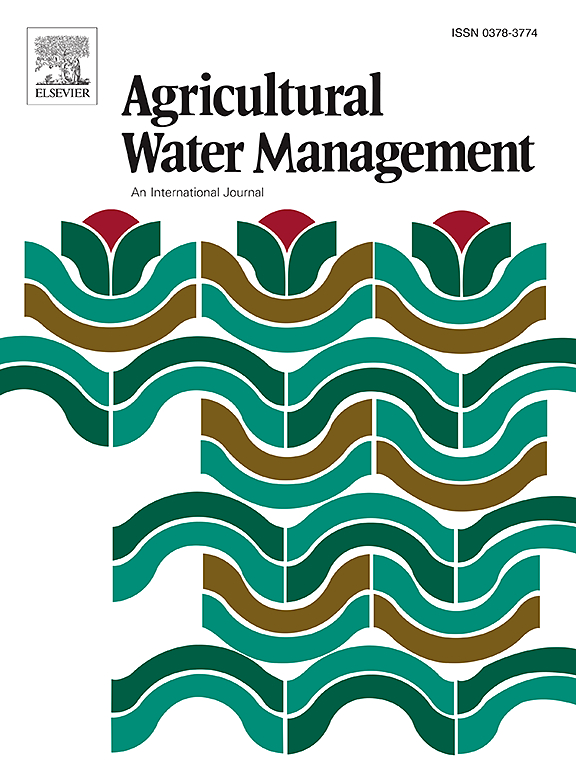Enhancing cotton irrigation with distributional actor–critic reinforcement learning
IF 5.9
1区 农林科学
Q1 AGRONOMY
引用次数: 0
Abstract
Accurate predictions of irrigation’s impact on crop yield are crucial for effective decision-making. However, current research predominantly focuses on the relationship between irrigation events and soil moisture, often neglecting the physiological state of the crops themselves. This study introduces a novel intelligent irrigation approach based on distributional reinforcement learning, ensuring that the algorithm simultaneously considers weather, soil, and crop conditions to make optimal irrigation decisions for long-term benefits. To achieve this, we collected climate data from 1980 to 2024 and conducted a two-year cotton planting experiment in 2023 and 2024. We used soil and plant state indicators from 5 experimental groups with varying irrigation treatments to calibrate and validate the DSSAT model. Subsequently, we innovatively integrated a distributional reinforcement learning method—an effective machine learning technique for continuous control problems. Our algorithm focuses on 17 indicators, including crop leaf area, stem leaf count, and soil evapotranspiration, among others. Through a well-designed network structure and cumulative rewards, our approach effectively captures the relationships between irrigation events and these states. Additionally, we validated the robustness and generalizability of the model using three years of extreme weather data and two consecutive years of cross-site observations. This method surpasses previous irrigation strategies managed by standard reinforcement learning techniques (e.g., DQN). Empirical results indicate that our approach significantly outperforms traditional agronomic decision-making, enhancing cotton yield by 13.6% and improving water use efficiency per kilogram of crop by 6.7%. In 2024, our method was validated in actual field experiments, achieving the highest yield among all approaches, with a 12.9% increase compared to traditional practices. Our research provides a robust framework for intelligent cotton irrigation in the region and offers promising new directions for implementing smart agricultural decision systems across diverse areas.
分布式行为者评价强化学习增强棉花灌溉
准确预测灌溉对作物产量的影响对有效决策至关重要。然而,目前的研究主要集中在灌溉事件与土壤水分的关系上,往往忽视了作物本身的生理状态。本研究引入了一种基于分布式强化学习的新型智能灌溉方法,确保算法同时考虑天气、土壤和作物条件,以做出长期效益的最佳灌溉决策。为此,我们收集了1980年至2024年的气候数据,并在2023年和2024年进行了为期两年的棉花种植实验。我们使用5个试验组不同灌溉处理的土壤和植物状态指标来校准和验证DSSAT模型。随后,我们创新地集成了分布式强化学习方法-一种有效的连续控制问题的机器学习技术。我们的算法重点关注17个指标,包括作物叶面积、茎叶数和土壤蒸散量等。通过精心设计的网络结构和累积奖励,我们的方法有效地捕获了灌溉事件与这些状态之间的关系。此外,我们利用三年极端天气数据和连续两年的跨站点观测验证了模型的稳健性和泛化性。该方法超越了以前由标准强化学习技术(例如DQN)管理的灌溉策略。实证结果表明,该方法显著优于传统农艺决策,棉花产量提高13.6%,每公斤作物水分利用效率提高6.7%。2024年,我们的方法在实际的田间试验中得到了验证,在所有方法中获得了最高的产量,比传统方法提高了12.9%。我们的研究为该地区的智能棉花灌溉提供了一个强大的框架,并为在不同地区实施智能农业决策系统提供了有希望的新方向。
本文章由计算机程序翻译,如有差异,请以英文原文为准。
求助全文
约1分钟内获得全文
求助全文
来源期刊

Agricultural Water Management
农林科学-农艺学
CiteScore
12.10
自引率
14.90%
发文量
648
审稿时长
4.9 months
期刊介绍:
Agricultural Water Management publishes papers of international significance relating to the science, economics, and policy of agricultural water management. In all cases, manuscripts must address implications and provide insight regarding agricultural water management.
 求助内容:
求助内容: 应助结果提醒方式:
应助结果提醒方式:


